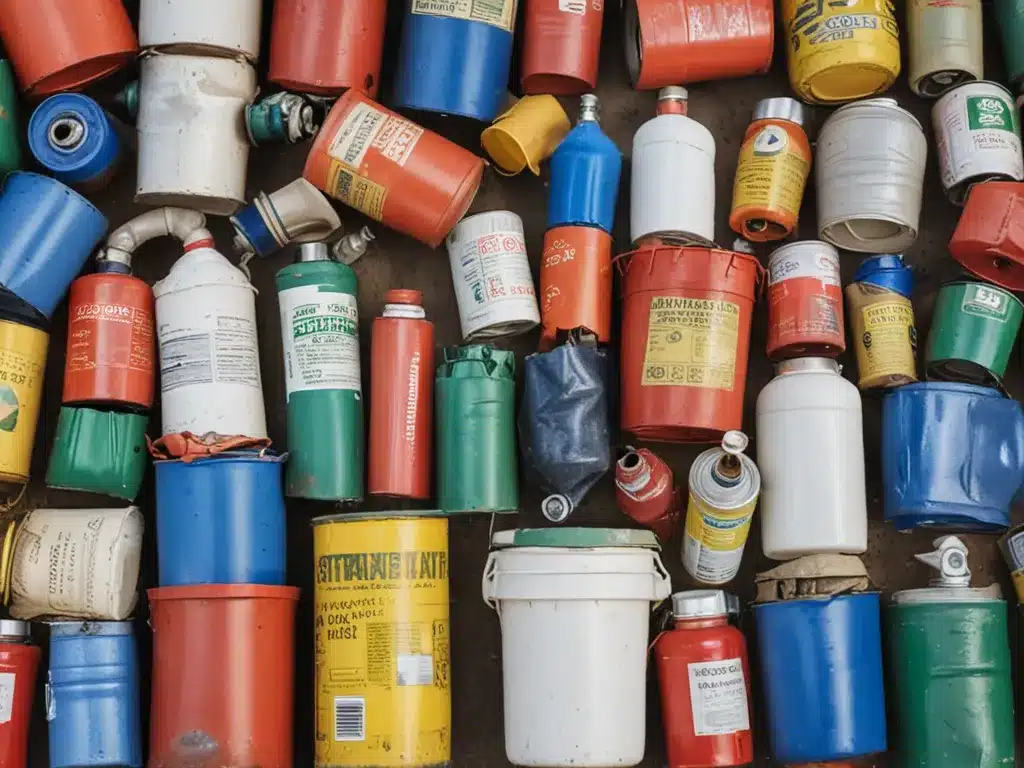Introduction
Household hazardous waste (HHW) refers to leftover household products that contain corrosive, toxic, ignitable, or reactive ingredients. Improper disposal of HHW can be harmful to human health and the environment. As a responsible household, it is crucial to understand proper HHW disposal methods. This article provides a comprehensive guide on properly managing common HHW items.
Why Proper Disposal is Important
HHW contains hazardous chemicals that can contaminate landfills and water sources if not disposed of properly. For example, oil-based paints contain heavy metals like lead, mercury, and cadmium that can leach into groundwater. Improper disposal also poses risks like:
-
Contamination of drinking water – Substances from HHW can seep into groundwater and pollute drinking water sources.
-
Harm to sanitation workers – chemicals inhaled or absorbed through the skin can cause health issues for sanitation workers.
-
Air pollution – Burning HHW releases toxic fumes into the atmosphere.
-
Environmental harm – Improper HHW disposal negatively impacts ecosystems and wildlife health.
Following proper disposal guidelines reduces these risks and protects the health of the environment, wildlife, and people.
Identifying Household Hazardous Waste
HHW falls into the hazardous waste category for containing one or more of these properties:
Toxic
- Substances capable of causing injury or death when ingested, inhaled, or absorbed by the skin – e.g. bleach, ammonia-based cleaners, rust removers.
Ignitable
- Flammable liquids like solvents, oil-based paints, and varnish have a flashpoint under 60°C. Improper disposal can cause fire.
Corrosive
- Acidic or alkaline substances that corrode other materials like metal or tissue upon contact. Examples are drain cleaners, battery acid, and rust removers.
Reactive
- Substances that can explode or release toxic fumes when exposed to air, heat, water or shock – e.g. pool chemicals.
Check product labels for words like “caustic”, “flammable”, “toxic” or “danger” to identify HHW items.
Common Household Hazardous Waste
Some examples of HHW commonly generated at homes:
Automotive fluids
- Motor oil, brake fluid, gasoline, wiper fluid, antifreeze etc.
Batteries
- Single-use and rechargeable batteries.
Cleaning products
- Floor care products, drain cleaners, oven cleaners, furniture polish etc.
Lighting
- Fluorescent tubes, CFL bulbs, halogen bulbs.
Paint products
- Oil-based or acrylic paint, varnish, thinner, remover, wood preservative.
Pesticides
- Insecticides, herbicides, fungicides, rat poison.
Electronics
- Devices containing heavy metals like mercury, lead and cadmium.
Proper Disposal Methods
Follow these tips for safe management of different HHW:
Hazardous Waste Collection Events
Many municipalities organize household hazardous waste collection events periodically. This allows residents to properly dispose of their HHW. Check with your local sanitation department for upcoming collection drives. For example, in my city these events are held bi-annually at the landfill site. I drive my HHW to the event and experienced staff sorts them into proper waste streams.
Permanent Collection Facilities
Some counties have permanent HHW drop-off locations open year-round. Contact your county office to find the nearest drop-off facility. At my local HHW facility, I can dispose of paint, batteries, motor oil, and chemicals free of charge. The staff assists in unloading the waste.
Retailer Take-Back Programs
Many retailers like hardware stores, pharmacies, and automotive centers accept back specific HHW. For example, I can take used motor oil, batteries, and CFL bulbs back to the auto parts store for proper recycling or disposal. Check with local retailers on what products they accept.
Household Hazardous Waste Pickup
Some municipalities provide household pickup services for HHW disposal. A resident has to call and schedule a pickup. I schedule annual HHW pickup at my home for waste like paints, pesticides, CFL bulbs, and cleaning agents. The city provides proper containers to pack the HHW.
Licensed Hazardous Waste Haulers
For large volumes, consider hiring a professional hazardous waste hauling service. They will safely collect and dispose HHW in compliance with regulations. I hired a licensed hauler when disposing leftover roofing tar, sealants, and paint after home renovations.
Municipal Trash Guidelines
Households can dispose of some HHW via regular trash pickup by following municipality guidelines. For example, my city allows disposal of small Lithium batteries by taping terminals and placing in a sealed plastic bag.
Safe Handling Tips
-
Read product labels and follow precautions. Wear gloves and safety gear when handling HHW.
-
Never dump HHW in sinks, storm drains or on the ground.
-
Do not mix HHW products together. It can cause dangerous chemical reactions.
-
Store HHW securely in original containers with proper labels.
-
If you cannot identify something as HWW, assume it is hazardous and keep it apart.
Conclusion
As a responsible household, I try to minimize my use of hazardous products. For unavoidable HHW, I strictly adhere to my municipality’s disposal guidelines. Proper HHW management reduces health and environmental risks. Our small actions can collectively make a huge difference.







